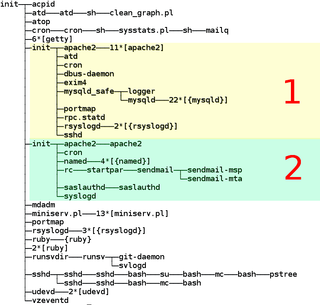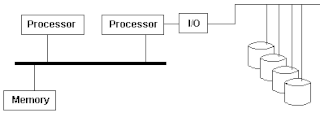In computing, a context switch is the process of storing the state of a process or thread, so that it can be restored and resume execution at a later point. This allows multiple processes to share a single central processing unit (CPU), and is an essential feature of a multitasking operating system.

The hertz (symbol: Hz) is the unit of frequency in the International System of Units (SI) and is defined as one cycle per second. The hertz is an SI derived unit whose expression in terms of SI base units is s−1, meaning that one hertz is the reciprocal of one second. It is named after Heinrich Rudolf Hertz (1857–1894), the first person to provide conclusive proof of the existence of electromagnetic waves. Hertz are commonly expressed in multiples: kilohertz (103 Hz, kHz), megahertz (106 Hz, MHz), gigahertz (109 Hz, GHz), terahertz (1012 Hz, THz).
A real-time operating system (RTOS) is an operating system (OS) for real-time applications that processes data and events that have critically defined time constraints. An RTOS is distinct from a time sharing operating system, ..) such as Unix, which manages the sharing of system resources with a scheduler, data buffers, or fixed task prioritization in a multitasking or multiprogramming environment. Processing time requirements need to be fully understood and bound rather than just kept as a minimum. All processing must occur within the defined constrain systems are event-driven and preemptive, meaning the OS is capable of monitoring the relevant priority of completing tasks, and make changes to the task priority. Event-driven systems switch between tasks based on their priorities, while time-sharing systems switch the task based on clock interrupts.

In computing, a process is the instance of a computer program that is being executed by one or many threads. It contains the program code and its activity. Depending on the operating system (OS), a process may be made up of multiple threads of execution that execute instructions concurrently.

In computer science, a thread of execution is the smallest sequence of programmed instructions that can be managed independently by a scheduler, which is typically a part of the operating system. The implementation of threads and processes differs between operating systems, but in most cases a thread is a component of a process. The multiple threads of a given process may be executed concurrently, sharing resources such as memory, while different processes do not share these resources. In particular, the threads of a process share its executable code and the values of its dynamically allocated variables and non-thread-local global variables at any given time.

Symmetric multiprocessing or shared-memory multiprocessing (SMP) involves a multiprocessor computer hardware and software architecture where two or more identical processors are connected to a single, shared main memory, have full access to all input and output devices, and are controlled by a single operating system instance that treats all processors equally, reserving none for special purposes. Most multiprocessor systems today use an SMP architecture. In the case of multi-core processors, the SMP architecture applies to the cores, treating them as separate processors.
In computing, scheduling is the action of assigning resources to perform tasks. The resources may be processors, network links or expansion cards. The tasks may be threads, processes or data flows.

Round-robin (RR) is one of the algorithms employed by process and network schedulers in computing. As the term is generally used, time slices are assigned to each process in equal portions and in circular order, handling all processes without priority. Round-robin scheduling is simple, easy to implement, and starvation-free. Round-robin scheduling can be applied to other scheduling problems, such as data packet scheduling in computer networks. It is an operating system concept.
In economics, resource allocation is the assignment of available resources to various uses. In the context of an entire economy, resources can be allocated by various means, such as markets, or planning.
Fair-share scheduling is a scheduling algorithm for computer operating systems in which the CPU usage is equally distributed among system users or groups, as opposed to equal distribution of resources among processes.
nice is a program found on Unix and Unix-like operating systems such as Linux. It directly maps to a kernel call of the same name. nice is used to invoke a utility or shell script with a particular CPU priority, thus giving the process more or less CPU time than other processes. A niceness of -20 is the highest priority and 19 is the lowest priority. The default niceness for processes is inherited from its parent process and is usually 0.
In computer science, a multilevel feedback queue is a scheduling algorithm. Scheduling algorithms are designed to have some process running at all times to keep the central processing unit (CPU) busy. The a multilevel feedback queue extends standard algorithms with the following design requirements:
- Separate processes into multiple ready queues based on their need for the processor.
- Give preference to processes with short CPU bursts.
- Give preference to processes with high I/O bursts.
In system software, a job queue, is a data structure maintained by job scheduler software containing jobs to run.

OpenVZ is an operating-system-level virtualization technology for Linux. It allows a physical server to run multiple isolated operating system instances, called containers, virtual private servers (VPSs), or virtual environments (VEs). OpenVZ is similar to Solaris Containers and LXC.
The stride scheduling is a type of scheduling mechanism that has been introduced as a simple concept to achieve proportional CPU capacity reservation among concurrent processes. Stride scheduling aims to sequentially allocate a resource for the duration of standard time-slices (quantum) in a fashion, that performs periodic recurrences of allocations. Thus, a process p1 which has reserved twice the share of a process p2 will be allocated twice as often as p2. In particular, process p1 will even be allocated two times every time p2 is waiting for allocation, assuming that neither of the two processes performs a blocking operation.

In computer architecture, multithreading is the ability of a central processing unit (CPU) to provide multiple threads of execution concurrently, supported by the operating system. This approach differs from multiprocessing. In a multithreaded application, the threads share the resources of a single or multiple cores, which include the computing units, the CPU caches, and the translation lookaside buffer (TLB).

OS/360, officially known as IBM System/360 Operating System, is a discontinued batch processing operating system developed by IBM for their then-new System/360 mainframe computer, announced in 1964; it was influenced by the earlier IBSYS/IBJOB and Input/Output Control System (IOCS) packages for the IBM 7090/7094 and even more so by the PR155 Operating System for the IBM 1410/7010 processors. It was one of the earliest operating systems to require the computer hardware to include at least one direct access storage device.

The Slurm Workload Manager, formerly known as Simple Linux Utility for Resource Management (SLURM), or simply Slurm, is a free and open-source job scheduler for Linux and Unix-like kernels, used by many of the world's supercomputers and computer clusters.

An asymmetric multiprocessing system is a multiprocessor computer system where not all of the multiple interconnected central processing units (CPUs) are treated equally. For example, a system might allow only one CPU to execute operating system code or might allow only one CPU to perform I/O operations. Other AMP systems might allow any CPU to execute operating system code and perform I/O operations, so that they were symmetric with regard to processor roles, but attached some or all peripherals to particular CPUs, so that they were asymmetric with respect to the peripheral attachment.
Heterogeneous System Architecture (HSA) is a cross-vendor set of specifications that allow for the integration of central processing units and graphics processors on the same bus, with shared memory and tasks. The HSA is being developed by the HSA Foundation, which includes AMD and ARM. The platform's stated aim is to reduce communication latency between CPUs, GPUs and other compute devices, and make these various devices more compatible from a programmer's perspective, relieving the programmer of the task of planning the moving of data between devices' disjoint memories.








